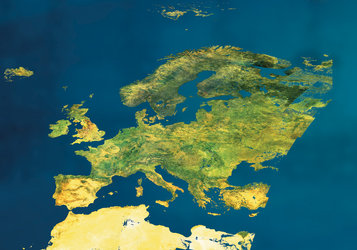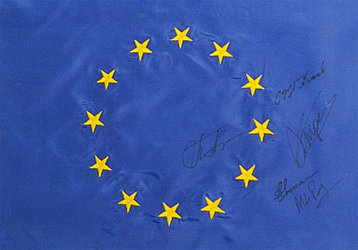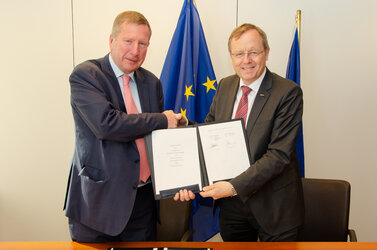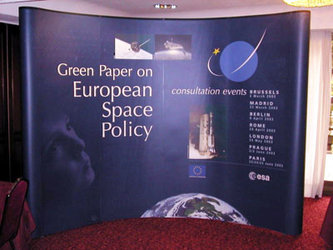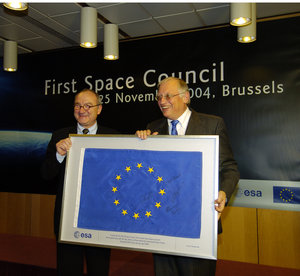ESA and the EU
ESA has been a close partner with the EU in European space for decades – but the two organisations are quite distinct. ESA is an intergovernmental organisation, whereas the EU is supranational. The two institutions have different ranges of competences, different member states and are governed by different rules and procedures. Yet ESA and the EU share a common aim: to strengthen Europe and benefit its citizens.
While ESA and the EU are separate organisations, they work increasingly closely together. Most recently, ESA and the EU signed an agreement to use space to help keep information secure. Called “Iris2” – which stands for “Infrastructure for Resilience, Interconnectivity and Security by Satellite” – the system will promote digital autonomy and provide a strategic asset for the EU. It envisages a constellation of satellites – supported by information-relaying infrastructure on the ground – that will be used by European governments and businesses to keep information secure and confidential.
ESA has designed and developed elements of the EU’s space programme including the Galileo system – with its 28-satellite constellation and its global ground stations – that together provide a highly accurate, guaranteed global positioning service under civilian control, as well as the fleet of EU Copernicus Earth observation satellites that deliver data to improve the management of the environment, understand and mitigate the effects of climate change, and ensure civil security. ESA also created the EU’s European satellite navigation system for aircraft.
The legal basis for the ESA/EU cooperation is provided by a Financial Framework Partnership Agreement (FFPA), the most recent of which was officially signed on 22 June 2021 in a ceremony to celebrate the launch of the EU’s space programme.
The agreement represents an EU investment of almost €9 billion in the period of 2021 to 2027. This funding adds to ESA’s budget and consolidates an ambitious set of mandatory and optional programmes defined by ESA Member States.
The FFPA defines the roles and responsibilities of all partners, the European Commission, ESA and the EU’s space programme agency, EUSPA. It ensures the level of autonomy of ESA that is needed to efficiently develop and implement the programmes.
ESA maintains a liaison office in Brussels to facilitate relations with European institutions.















 Germany
Germany
 Austria
Austria
 Belgium
Belgium
 Denmark
Denmark
 Spain
Spain
 Estonia
Estonia
 Finland
Finland
 France
France
 Greece
Greece
 Hungary
Hungary
 Ireland
Ireland
 Italy
Italy
 Luxembourg
Luxembourg
 Norway
Norway
 The Netherlands
The Netherlands
 Poland
Poland
 Portugal
Portugal
 Czechia
Czechia
 Romania
Romania
 United Kingdom
United Kingdom
 Slovenia
Slovenia
 Sweden
Sweden
 Switzerland
Switzerland




























